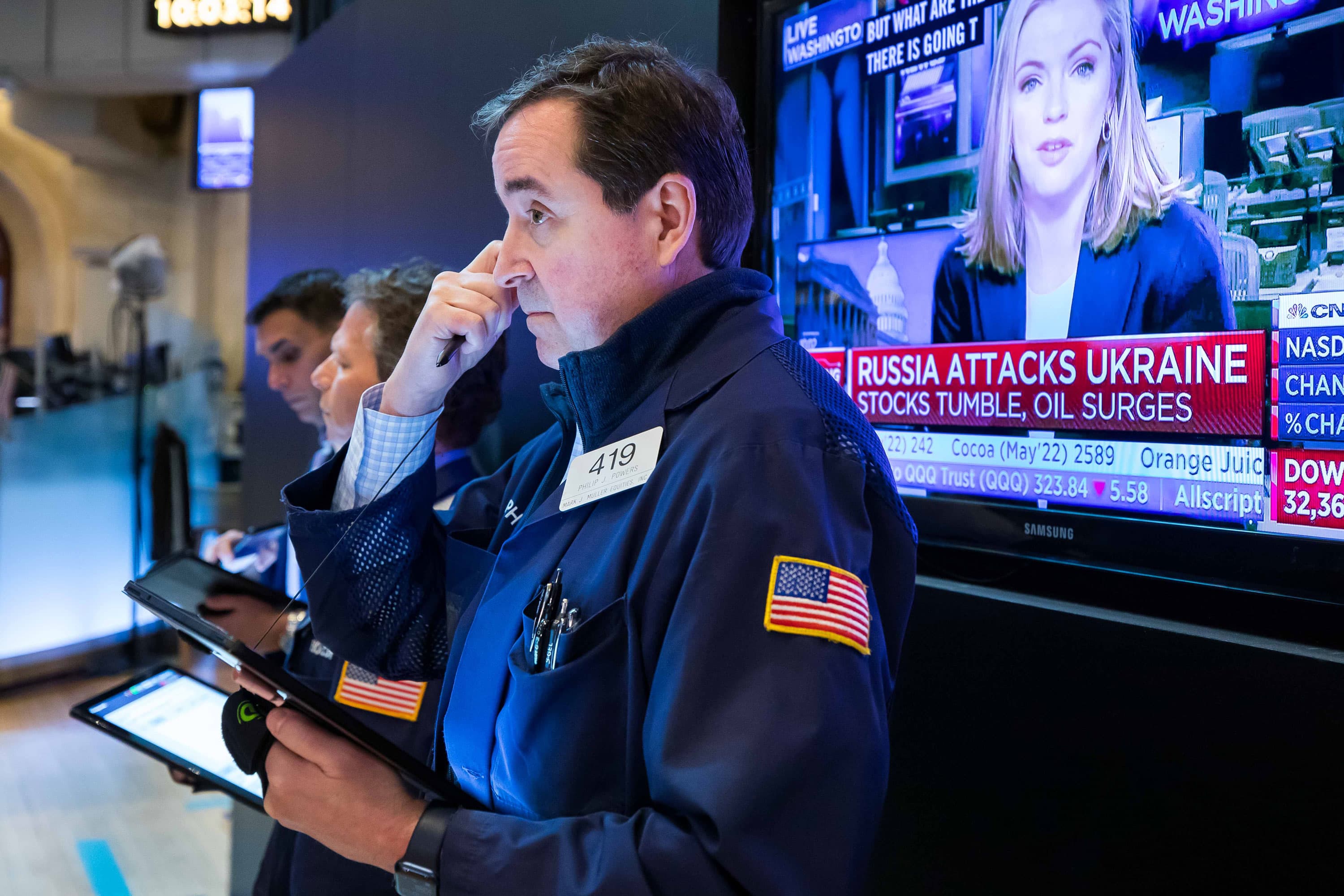Dow futures fall more than 300 points as traders assess ripple effects of Russia sanctions

Traders on the floor of the NYSE, Feb. 24, 2022.
Source: NYSE
U.S. stock futures moved lower early on Monday as investors grew concerned about the economic ramifications of the fighting between Russia and Ukraine.
Dow futures dropped 436 points. S&P 500 futures fell 1.63% and Nasdaq 100 futures lost 1.59%.
U.S. and global equities experienced volatile trading last week as geopolitical tensions between Russia and Ukraine escalated. Early Thursday morning local time, Moscow launched military action in Ukraine.
Throughout the weekend, the Russian advance into Ukraine continued. Russian military vehicles entered Ukraine’s second-largest city Kharkiv with reports of fighting taking place and residents being warned to stay in shelters.
Russian President Vladimir Putin put his country’s nuclear deterrence forces on high alert Sunday amid a growing global backlash against the invasion. Ukraine’s Defense Ministry said representatives for Ukraine and Russia have agreed to meet on the Ukraine-Belarus border “with no preconditions.”
U.S. West Texas Intermediate (WTI) crude future rose more than 4%to around $95.60 per barrel on Sunday. The April Brent crude futures contract also rose 4% to near $102 per barrel.
Last week, President Joe Biden reacted to the attack by announcing several rounds of sanctions on Russian banks, on the country’s sovereign debt and Putin and Foreign Minister Sergey Lavrov.
The U.S., European allies and Canada agreed Saturday to remove key Russian banks from the interbank messaging system, SWIFT.
“Some Russian banks being removed from SWIFT (energy transactions exempt) and the freezing of the Russian central bank’s access to its foreign currency reserves held in the West clearly increases economic tail risk,” said Dennis DeBusschere of 22V Research.
However, he believes Russia can still sell oil and there could be “loop holes” in Russia’s frozen assets, which “might limit the disaster in markets for a few days.”
The Russian ruble was set to tumble at least 19% with banks offering it at about 100 rubles per dollar, according to Reuters. It closed Friday at 84 rubles per dollar.
“Traders will be watching for any signs of resolution on the Russian crisis (negotiated peace or a signs of a near-term victory for either side) or for signs tensions could be worsening raising the chance of a world war involving NATO members,” said Jim Paulsen, chief investment strategist for the Leuthold Group. “As news trickles out supporting either thesis, expect daily stock market action to remain volatile.”
Despite the market volatility, the Dow experienced its best day since November 2020 on Friday.
Last week, the Dow notched its third week of losses. The S&P 500 and Nasdaq ended the week in green, rising 0.8% and 1.1%, respectively.
The Nasdaq Composite is still in correction, about 15% from its record close. The Dow and S&P 500 are just outside of correction territory.
Federal Reserve Chairman Jerome Powell testifies before Congress twice in the coming week, and he will be followed closely for any signal on whether geopolitical events are likely to impact Fed rate hikes.
Investors will also get a update on the labor department later in the week as the February jobs report is expected Friday. In January, 467,000 payrolls were added.




